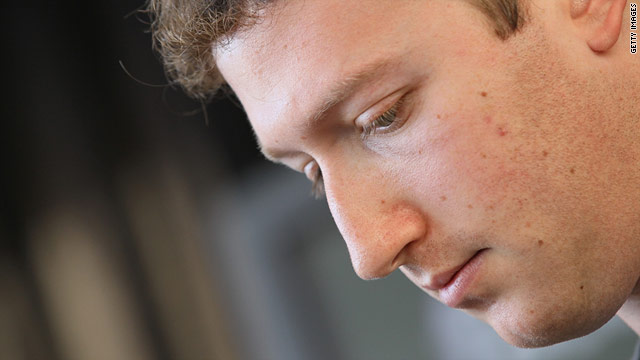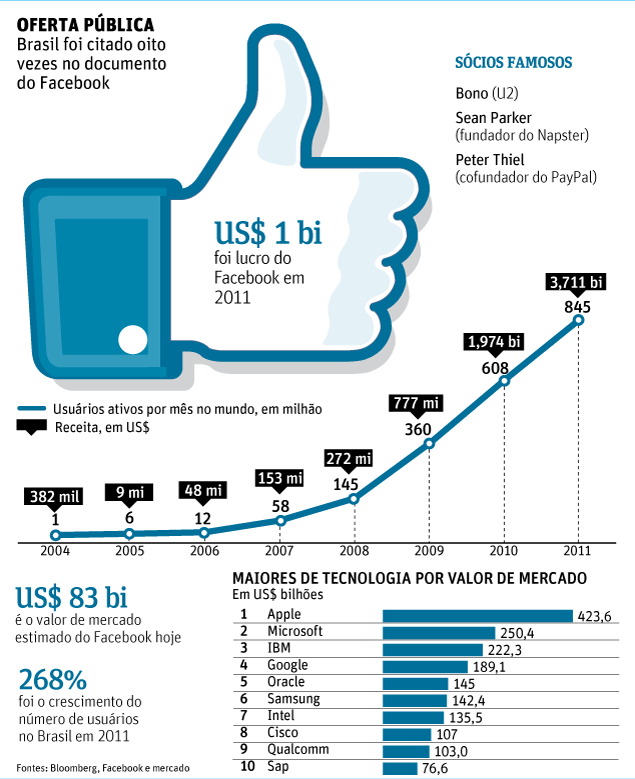No momento em que o site está prestes a abrir seu capital na bolsa, especialista da BBC diz que usuário do site não é consumidor, e sim produto.
A confirmação de que a rede social Facebook se prepara para uma oferta pública de ações (IPO, na sigla em inglês) na bolsa em Nova York na próxima semana fizeram ressurgir especulações sobre o real valor da companhia, que poderia girar entre US$ 75 bilhões e US$ 100 bilhões.
Responsáveis pelo site devem entregar nesta quarta-feira documentos atestando a transparência do Facebook à agência reguladora do mercado financeiro americano, a Securities and Exchange Comission (SEC). Mas, segundo o jornal New York Times, a operação pode ser adiada.
Fundado em 2004 por Mark Zuckerberg, quando ele estudava em Harvard, o Facebook conta atualmente com cerca de 800 milhões de usuários em todo o mundo.
Segundo o especialista em tecnologia da BBC Rory Cellan-Jones, o que está em jogo nessa oferta pública de ações é o valor que têm esses milhões de usuários.
"O mundo está aguardando a operação mais esperada desde o IPO do Google, fica claro que o que está à venda é você - usuário - e seus 800 milhões de amigos."
O Facebook, assim como o Google, está no setor de propaganda e introduziu uma maneira radical de atingir seus consumidores, afirmou Cellan-Jones.
"Com o Google, isso ocorria pelas nossas buscas; com o Facebook, pelos nossos 'Curtir' e outras informações que colocamos livremente no site."
Muito o que provar
Cellan-Jones afirma que, com o IPO, vamos saber quanto esse tipo de propaganda está rendendo ao Facebook e a rapidez com que esse mercado está crescendo.
A partir disso, Wall Street terá de decidir como colocar o preço nessas ações. Para o especialista, especulações dizendo que o valor da empresa pode chegar a US$ 100 bilhões soam ridículas diante de um negócio que ainda tem muito o que provar.
"Mas os otimistas vão dizer que houve um ceticismo semelhante no caso do Google, em 2004. E o site de buscas provou que valia muito mais do que as especulações iniciais."
De qualquer maneira, a abertura de ações do Facebook vai gerar quantias invejáveis para bancos de investimentos, advogados e, claro, para Zuckerberg e seus parceiros.
"E aí que a parte difícil começa - mostrar que a audiência do Facebook é realmente uma fonte rentável, disposta a ser alvo de cada vez mais anúncios. Em outras palavras, agora é com você e seus amigos do Facebook."
Como quantificar
Daniel Pardo, da BBC Mundo, explica que a cada vez que um usuário "curte", comenta, busca informações ou publica fotos ou comentários, sua ação é informada aos anunciantes. Estes, por sua vez, traçam um perfil do usuário e enviam anúncios dirigidos.
Segundo o jornalista especializado em tecnologia, Aleks Krotoski, "os usuários são a matéria-prima". Os 800 milhões de usuários do Facebook não seriam clientes, e sim produtos.
E são justamente as informações sobre os usuários, antes restritas aos donos dos perfis e seus amigos, que estarão sendo ofertadas na Bolsa.
Segundo o presidente executivo do made.com (um dos fundadores do site lastminute.com), Brent Hoberman, há estudos que mostram que um adolescente americano estaria disposto a entregar toda a informação de sua vida por apenas US$ 5.
Não existem, no entanto, estudos que mostrem quanto vale um usuário do Facebook, segundo explica Jim Brigden, presidente da consultora em internet I Spy.
"Os preços dos anúncios são fáceis de estimar, pois se sabe quantas pessoas viram ou quantos compraram um produto. Mas o valor de um usuário é muito mais subjetivo e variável, o que faz seu valor difícil de estimar", diz.
O valor do curtir
A chave do sucesso do Facebook nos negócios será, logo, o fato de que quanto mais específica a informação que o anunciante terá do consumidor, mais estará disposto a pagar pela rede social.
Segundo informações do próprio Facebook, se o anunciante sabe que o consumidor é um homem, paga US$ 1,16 para cada mil usuários que virem sua publicidade. Mas se o homem é casado, terá de pagar US$ 1,38.
Para Andrés Snitcofsky, especialista em comércio eletrônico, ainda é difícil definir quanto vale um "curtir", já que não se sabe "qual o nivel de sinceridade do 'curtir'".
Brigden assegura, no enanto, que se farão estudos assim cedo ou tarde.
"À medida que a rede se torne sofisticada, e à medida que se estude o comportamento dos usuários, poderemos estimar com maior facilidade o quanto vale o conteúdo de um usuário, de acordo com a forma como ele usa usa a rede social", diz.
 Desvendar as características da personalidade dos jogadores – na verdade, das jogadoras – com auxílio de Deusas da antiguidade. Essa é a proposta do game Templo das Deusas, desenvolvido para o Facebook com o apoio do programa de cultura do Banco do Nordeste/BNDES. O jogo foi idealizado pela terapeuta comportamental e especialista em desenvolvimento feminino Cristhyane Ribeiro. Segundo ela, o Templo das Deusas é um jogo tipo RPG dirigido às mulheres de todas as idades. “O game oferece dicas, orientações e soluções personalizadas do universo feminino para ampliar o repertório das jogadoras em seus relacionamentos reais, na vida social, afetiva, amorosa ou profissional”, explica. A “aventura” começa no tempo da Deusa grega Afrodite. Para seguir avançando, é preciso utilizar alguns recursos femininos como poção do amor, palavras mágicas, oráculo da verdade ou maquiagem. Em alguns momentos a jogadora será questionada sobre qual atitude tomar, como ela aconselharia a Deusa ou como agiria em determinada situação.
Desvendar as características da personalidade dos jogadores – na verdade, das jogadoras – com auxílio de Deusas da antiguidade. Essa é a proposta do game Templo das Deusas, desenvolvido para o Facebook com o apoio do programa de cultura do Banco do Nordeste/BNDES. O jogo foi idealizado pela terapeuta comportamental e especialista em desenvolvimento feminino Cristhyane Ribeiro. Segundo ela, o Templo das Deusas é um jogo tipo RPG dirigido às mulheres de todas as idades. “O game oferece dicas, orientações e soluções personalizadas do universo feminino para ampliar o repertório das jogadoras em seus relacionamentos reais, na vida social, afetiva, amorosa ou profissional”, explica. A “aventura” começa no tempo da Deusa grega Afrodite. Para seguir avançando, é preciso utilizar alguns recursos femininos como poção do amor, palavras mágicas, oráculo da verdade ou maquiagem. Em alguns momentos a jogadora será questionada sobre qual atitude tomar, como ela aconselharia a Deusa ou como agiria em determinada situação.





















